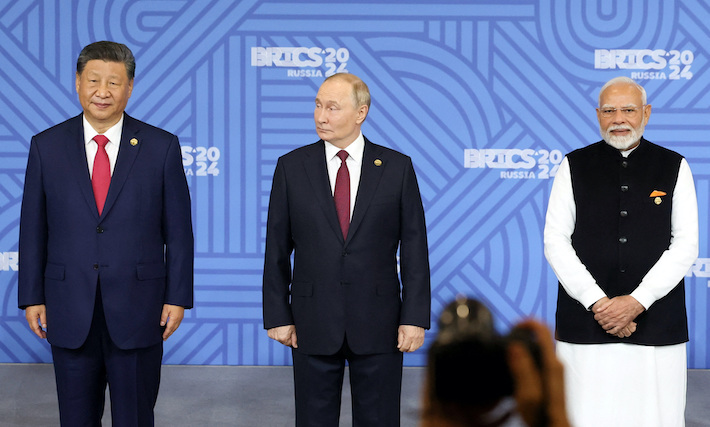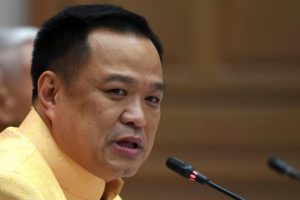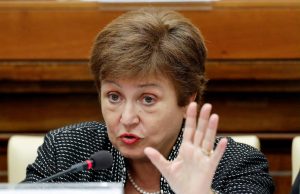Chinese President Xi Jinping and Indian Prime Minister Narendra Modi had their first talks in five years at the BRICS summit in Russia on Wednesday.
Leaders of the two Asian giants have sought to bury the hatchet after a deadly border skirmish in mid-2020 that poisoned bilateral ties. They now appear to be seeking a more harmonious relationship.
The meeting between Xi and Modi was just one highlight the summit, where President Vladimir Putin tried to show that the West has failed to isolate Russia over its war in Ukraine.
ALSO SEE: EV Shift to Have Far-Reaching Impact on Trade, Employment: IMF
A final communique listed a number of projects aimed at facilitating trade between BRICS nations – including an alternative payment system to the dollar – but did not include details or timelines.
Just two days after New Delhi announced that it had reached a deal with Beijing to resolve a four-year military stand-off on their disputed Himalayan frontier, Xi told Modi that they should enhance communication and cooperation and effectively manage differences.
“It is in the fundamental interests of the two countries and peoples for China and India to correctly grasp the trend of history and the direction of development of their relations,” Xi said, according to Chinese state broadcaster CCTV.
In response, Modi told Xi that maintaining peace and stability on their frontier should be a priority, and that mutual trust, respect and sensitivity should be the basis of the relationship.
“We welcome the agreement on the issues that had come up over the last four years,” Modi told Xi in comments that were aired on India’s state broadcaster Doordarshan. Observers say the two countries are still on a path to normalizing relations.
Modi: BRICS must not be ‘anti-West’
Putin was quoted last week as saying that BRICS was “not anti-West”, but just made up of “non-West” countries.
Modi reportedly sought to emphasize that distinction on Wednesday, saying that BRICS should not project itself as an alternative to global organizations, despite founding members like Russia and China trying to expand the group to challenge the US-led global order.
In remarks at the closed plenary session of the summit, he was quoted as saying: “We must be careful to ensure that this organization does not acquire the image of one that is trying to replace global institutions,” adding that the group should work to reform institutions like the United Nations Security Council and multilateral lenders.
“We have to give the world the message that BRICS is not a divisive organization but one that works in the interest of humanity,” he said, according to India’s Business Standard.
13 new partner states
BRICS, which is an idea thought up inside Goldman Sachs two decades ago to describe the growing economic clout of China and other major emerging markets, is now a group that accounts for 45% of the world’s population and 35% of the global economy.
This year it has added 13 new “partner nations” from Africa, Central Asia, Southeast Asia and other regions – Algeria, Belarus, Bolivia, Cuba, Malaysia, Indonesia, Kazakhstan, Nigeria, Thailand, Turkey, Uganda, Uzbekistan and Vietnam.
The BRICS summit clashes with the International Monetary Fund and World Bank annual meetings in Washington, and significant outcomes have yet to emerge.
Former Goldman economist Jim O’Neill, who coined the BRIC term in 2001, said he had little optimism for the BRICS club as long as China and India remained so divided.
“It seems to me basically to be a symbolic annual gathering where important emerging countries, particularly noisy ones like Russia, but also China, can basically get together and highlight how good it is to be part of something that doesn’t involve the US and that global governance isn’t good enough,” O’Neill told Reuters.
Putin, who dismisses Western claims that he is a war criminal for Russia’s actions in Ukraine, hosted more than 20 leaders at the summit in the city of Kazan on the banks of the Volga, including Tayyip Erdogan, who leads NATO member Turkey, and Iranian President Masoud Pezeshkian.
Modi told Putin in public that he wanted peace in Ukraine. Xi discussed the war in the Ukraine behind closed doors with the Kremlin chief, as did United Arab Emirates President Sheikh Mohammed bin Zayed Al Nahyan who has sought to mediate.
The 43-page final communique from the summit ranged from geopolitics and narcotics to artificial intelligence and even the preservation of big cats, but lacked detail on some major issues. It mentioned Ukraine just once.
“We note with appreciation relevant proposals of mediation and good offices, aimed at a peaceful resolution of the conflict through dialogue and diplomacy,” the Kazan declaration said.
Israeli attacks condemned
The toughest language was reserved for the Middle East, calling for a ceasefire in the Gaza Strip and the West Bank, and denounced Israeli “attacks against humanitarian operations, facilities, personnel and distribution points.”
On alternative payment systems, there was little detail, though BRICS leaders expressed an interest in developing them and ordered central bankers to report back under the next presidency.
“The trend for the BRICS’ leading role in the global economy will only strengthen,” Putin said, citing population growth, urbanization, capital accumulation, and productivity growth as key factors.
China and India buy about 90% of Russia’s oil – Moscow’s biggest foreign currency earner. Russia is the world’s second largest oil exporter.
The leaders said they would seek to further develop BRICS’ institutional development, but gave little clarity on whether or not BRICS would be expanded.
Putin said that more than 30 states had expressed interest in joining the group but that it was important to strike a balance in any expansion.
“I will take the BRICS group seriously when I see signs that the two countries that really matter, China and India, actually really trying to agree on things, rather than effectively trying to confront each other all the time,” O’Neill said.
- Reuters with additional input and editing by Jim Pollard
ALSO SEE:
India And China Resolve Border Row, Agree to Separate Patrols
India Refusing to Restart Direct Passenger Flights With China
India’s Close Scrutiny of China Firms Worries Suppliers: Xiaomi
China’s Xi ‘True VIP’, Dominating Force at BRICS Summit – FT
‘Strange’ Xi Move to Skip BRICS Speech Fuels Rumours – Guardian
Russia’s Putin Asked to ‘Stay Away’ From BRICS Summit – Euronews
BRICS Looking to Counter Sanctions With Alternative Currencies
























